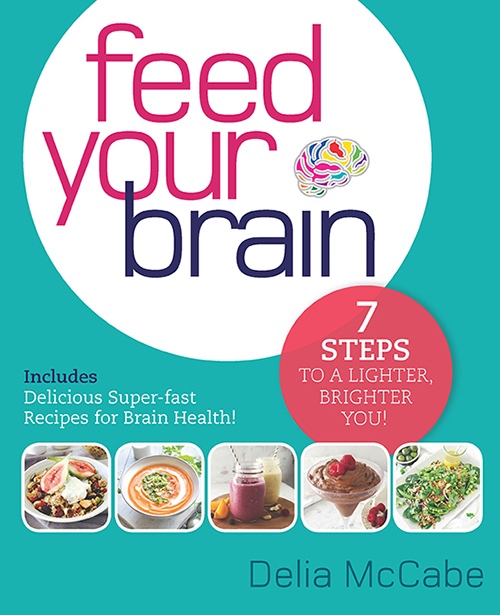
“Feed Your Brain” and “Feed Your Brain Cookbook“- Books on How to Nourish Your Brain by Dr. Delia McCabe
I was delighted to interview Dr. Delia McCabe, the author of Feed Your Brain and Feed Your Brain Cookbook, for her candid and informative advice on food selection. Delia completed her Ph.D. work on the effects of certain nutrients on female stress. Feed Your Brain is based on her 20 years of research on how food affects the human brain, such as influencing behavior, mood, and memory, and is appropriate for both children and adults.
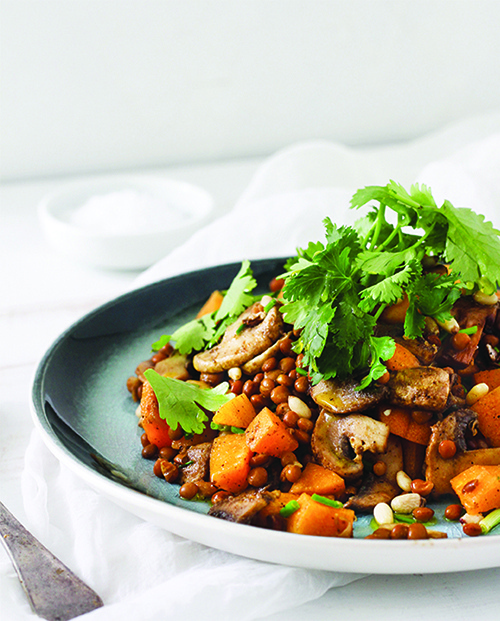
I asked Delia why she singled out the brain among all the human organs. According to Delia, even though the brain only accounts for two percent by weight of the human body, it uses 20 percent of the heart’s output of blood and 25 percent of the oxygen a person breathes; the brain is an active and demanding organ. When it is not well nourished, the whole body is compromised. Furthermore, it takes a long time for the brain to manifest problems. Once the problems occur, they are hard to fix.
Feed Your Brain also aims to dispel the myths of dietary supplements. Delia believes dietary supplements should be targeted to specific deficiencies. Her book advocates preventive methods: the quality of food directly impacts the brain. Our diet should be high in fiber to protect our gut lineages. Once the gut lining is damaged, this will cause inflammation and the waste compounds will go upstream to affect the brain. Thus, the gut is extremely important for our brain’s health; we need to be mindful of what we eat.

For diets, people should keep everything in balance. If people look for nutrition from animal products, they should select grass-fed and organic meat. Delia stresses it is important to know that our brains need fats of which nuts, and not just meat, are ideal sources. Nuts are powerhouses of energy because they contain good protein, fiber, and fat. Nuts also taste good; they are nutrient-dense, with good fats, and our brain loves their good taste. (The primary reason why the low-fat diet industry fails is that the food it prepares does not taste good.) Also, a good mouth-feel satisfies the brain.
As to how to prepare the nuts for meals, Delia recommends soaking the nuts in water and removing their husks because they produce acids (a way for nuts to protect themselves from insects). After drying the nuts, spread the nuts out on a pan, put them in the oven, and bake them in low heat (around 165F or 45C) until they are crunchy, which can be for up to five or six hours or longer. This will produce a crunchy texture. They are a great replacement for the roasted nuts from the store. Nuts also go well with smoothies, salads, and meals.
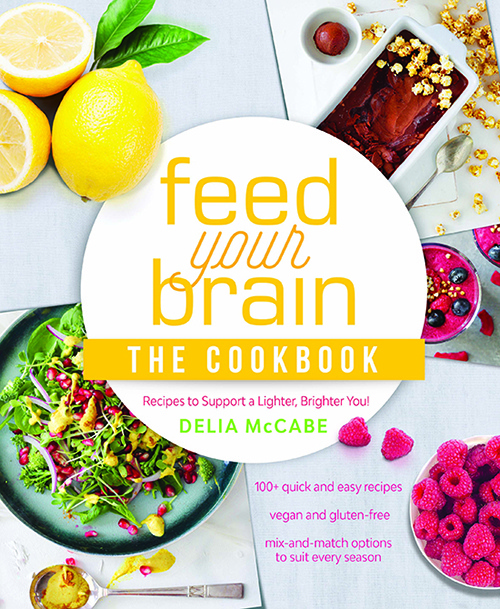
In Delia’s Feed Your Brain Cookbook, she talks about the color pigments in food. She displays a color-coded table of food describing the benefits certain colors of food provide. For example, green vegetables tend to produce antioxidants that are capable of combating free radicals in our bodies. It is essential to eat colorful plates of food, including bright-colored vegetables such as red, green, purples, and oranges. In the book, she provides healthy and yummy recipes for our daily meals using those vegetables and fruits.
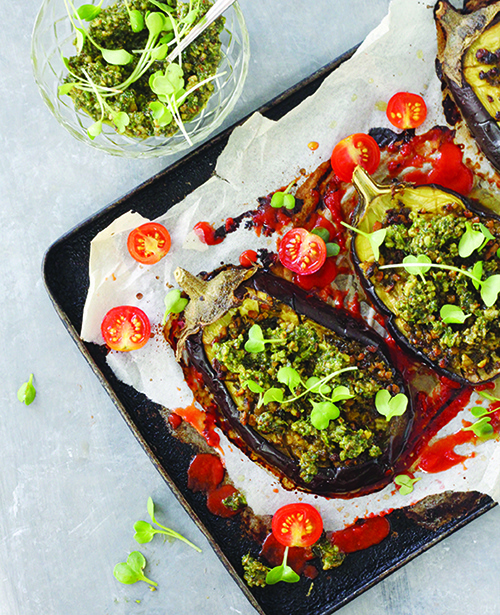
When I asked her for cooking tips, Delia advised people to avoid heating oil. Off-the-shelf oils are toxic. Furthermore, when we heat oil, the molecules become damaged. So try to stay away from sautéing–the correct way of cooking vegetables is to cook them in water. Once cooked, then take them off the stove and add the oil. Delia said this is the traditional way for Chinese and Mediterraneans to cook their food because oil was scarce and expensive in ancient times. It is only during modern times that people invented deep frying and sautéing (and this introduces many health problems including digestive problems).
A slow cooker is a good choice for healthy eating but should not be the only way of cooking. Depending on the individual, Delia recommends that three-quarters of our daily meals should consist of raw food while only one-quarter consist of cooked food. When preparing vegetables, try to choose organically grown. If not, use a mixture of one cup of vinegar and four cups of water to get rid of the residual pesticides on the surface of the vegetables. Growing your own vegetables is highly recommended by Delia.
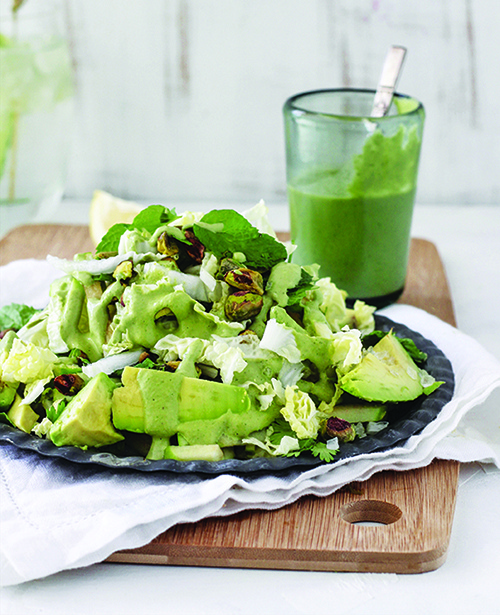
Delia states that according to research, young children may need to be exposed to a new food up to 12 times before they become accustomed to it and want to try tasting it. Parents should not bring their emotions or expectations to the table when letting their children try the new food. This is because there is an automatic, emotionally-based process in the child’s brain that activates when new food is encountered — a combination of mouth-feel and knowledge of what parents eat. Parents should make sure to provide a plate of mixed vegetables with a dip. New food is like alien food to children. Let them taste, sniff, and touch it. Homemade food is much better than store-bought food (unless people know how food is prepared at the restaurants.)
For older people, their teeth might have problems in eating harder food so cooked or steamed food is a better choice. Also, digestive enzymes are also important in order to help digestion and reduce acid reflux. Delia recommends fermented cabbages, like Sauerkraut; plant-based digestive enzyme capsules can also help with digestive issues.
Delia is like a living encyclopedia providing us information about diets ideal for feeding our brain. Her books provide so much more information that I highly recommend the reader to check them out.
Currently, Delia is consulting for corporations as well as giving private lessons. She also participates in webinars. You can purchase her books via the following link:
Feed Your Brain: The Cookbook
Feed Your Brain: 7 Steps to a Lighter, Brighter You!
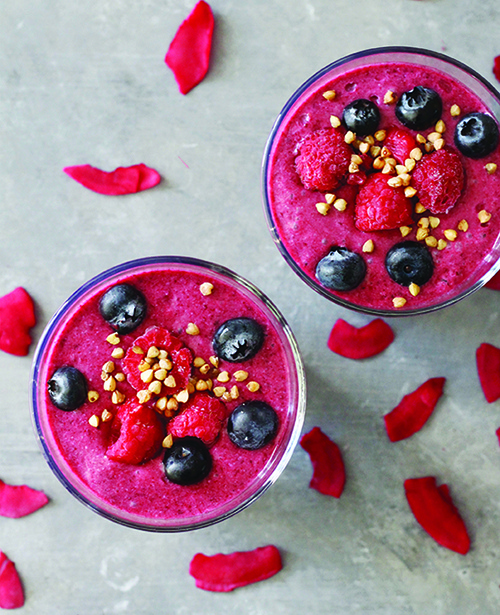
Dr. Delia Mccabe’s short bio:
Delia McCabe (Ph.D.) shifted her research focus from clinical psychology to nutritional neuroscience upon discovering nutrition’s critical role in mental wellbeing while completing her Masters’s. Delia’s research into the neurological effect of specific nutrients on female stress has been published in several peer-reviewed journals, she is a regularly featured expert in the media and her two internationally available books are available in four languages. Using her background in psychology, combined with evidence-based nutritional neuroscience and neurological perspectives, Delia supports behavior change and stress resiliency within corporates, and for individuals who want to optimize their brain health, via online courses, workshops, and tailored events internationally.
